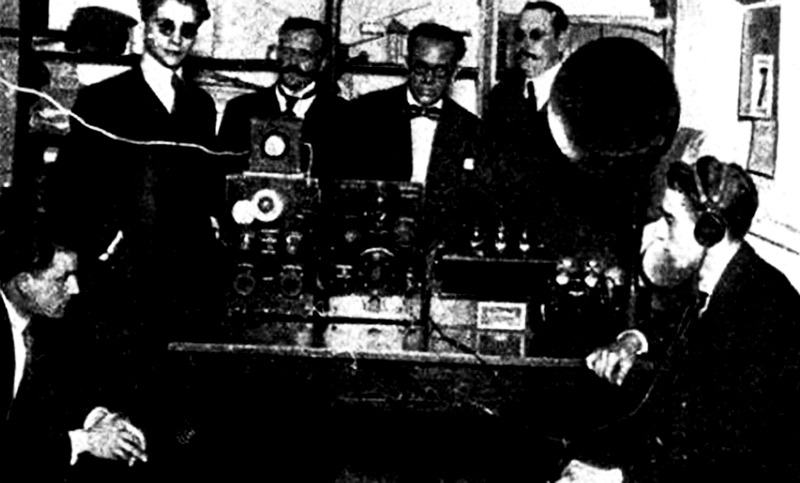A veces, los locos no son tal y por sus hechos crean acciones que cambian el mundo, o al menos la forma de percibirlo. Quizá, los locos en este caso fueron solo soñadores que se atrevieron a más y al día de hoy celebramos sus sueño.
“Los Locos de la Azotea” fue el nombre que se le dio a un grupo de amigos que, un día como hoy, pero de 1920, cambiarían para siempre la forma de informarnos, entretenernos y escucharnos. Un 27 de agosto de 1920 iba a llegar la radio en nuestro país.
Ese grupo estaba compuesto por Enrique Susini, César Guerrico, Luis Romero Carranza y Miguel Mujica, quienes exactamente desde las 21 y desde la azotea del Teatro Coliseo, transmitieron en vivo la ópera “Parsifal”. Sin saberlo, estaban dando el puntapié inicial a lo que sería la radiofonía argentina.
Fueron pocas las personas que ese día pudieron oír aquellas estrofas de la obra de Richard Wagner e incluso jamás se darían cuenta que serían mudos testigos de un hecho relevante para la historia no solo argentina, sino mundial.
Desde ese momento la radio fue evolucionando tanto en contenidos como en sus formatos y tecnología. Quizá hoy sea el podcast su hasta ahora último integrante de su suculento linaje. Lo cierto es que desde los informativos tempraneros, las radionovelas, las voces entrañables y el hecho de sentirse acompañados por una voz que no tenía rostro, hizo de la radio un integrante más de la familia.
Volviendo el tiempo atrás, más precisamente en 1910 y en Bernal, localidad ubicada al sur del conurbano bonaerense, Guillermo Marconi había sido quien diera los primeros avances con sus inventos que concluirían en una comunicación con Canadá e Irlanda, gracias al barrilete en que remontaba una antena.
Esto fue un disparador para los medios de aquel entonces, que reflejaban el avance en sus páginas. Los “Locos de la Azotea” se inspiraban también en estas publicaciones a la hora de desarrollar su idea.
Luego de la Primera Guerra Mundial, Susini, en pleno desarrollo de su carrera de médico, viajaría a Europa con la finalidad de estudiar los efectos de los gases asfixiantes. Ese viaje fue clave, ya que en Francia se hizo de equipos que luego utilizaría en la transmisión que se llevó adelante en el teatro Coliseo.
Esos equipos parecían trastos que fueron abandonados por el ejército, transmisores de 5 KW de potencia, fueron recibidos con los brazos abiertos por Susini. De esta manera, el grupo de amigos agregó una bocina para sordos a un micrófono y lo pusieron en la zona superior de la sala del Coliseo.
En cuanto al transmisor, resultó vital desde su puesto en la azotea, mientras que la antena fue un simple alambre ubicado entre el teatro y la cúpula del domicilio de César Guerrico, emplazado en el cruce de Cerrito y Charcas (actualmente Marcelo T. de Alvear), apenas unos 25 metros de distancia.
De los cuatro amigos, Susini quizá resultaría el más recordado, ya que su voz quedaría plasmada para siempre en la primera transmisión, expresando textualmente: “Señoras y señores, la Sociedad Radio Argentina les presenta hoy el Festival Sacro de Ricardo Wagner, ‘Parsifal’, con la actuación del tenor Maestri, el barítono Aldo Rossi Morelli y la soprano argentina Sara César, todos con la orquesta del teatro Costanzi de Roma, dirigida por el maestro Félix von Weingarten”.
Concretado ese sueño, al día siguiente se transmitió “Aída”, nuevamente “Parsifal” e “Iris”. Con este hito, también llegaría la primera licencia de la radiodifusión, la LOR, Radio Argentina.


